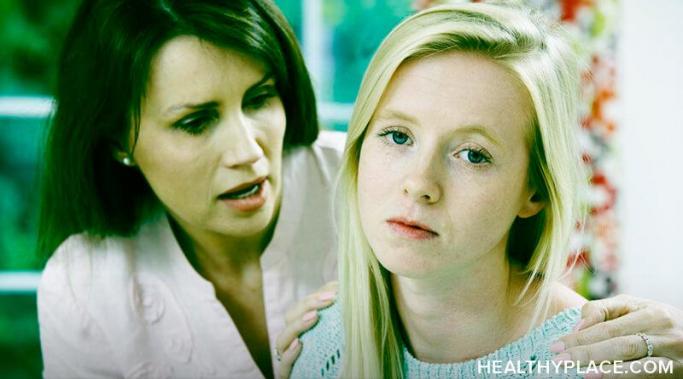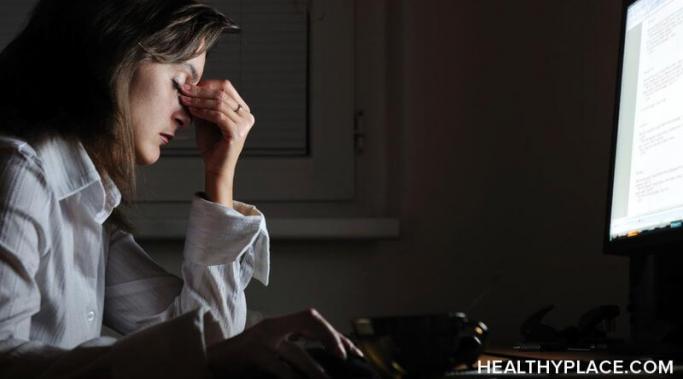I'm experiencing a profound depression right now, and I can tell you that I don't care about anything. I was thinking about how little I care. Good things have happened. Bad things have happened. But I don't care. Nothing touches me enough for me to actually care about it. Depression has definitely convinced me that I don't care about people, places, things, and everything in between.
Coping
Overdoing it with bipolar is not mentally healthy. Overdoing it is something people are encouraged to do regularly. The 9:00 a.m.-5:00 p.m. workday is a laugh for many people as work follows them, via cell phone, home, to the gym, and to the park with the kids. And then there's cooking, cleaning, friends, obligations, hobbies, and more with which to contend. And that doesn't even take into account "side gigs," which, for some reason, we're all supposed to have now. And while some people can handle a go-go-go lifestyle, people with a serious mental illness certainly cannot. When you have bipolar disorder, overdoing it comes with a very hefty price.
Mental illness puts thoughts in your head. The fact that mental illness puts thoughts in your head is pretty much the definition of most mental illnesses. If it wasn't for the unhealthy thoughts and feelings that we have, we wouldn't be sick. And just like everyone, we tend to judge our own thoughts and feelings -- even if they're illness-generated. Moreover, the judgment of our own thoughts and feelings often gets translated as a judgment of ourselves. For example, if we judge our thoughts and feelings as unacceptable, then we may feel that we are unacceptable. So, let's take a look at mental illness putting thoughts in our head and how we judge those thoughts.
Do people with bipolar disorder have good sex lives? Do people with bipolar disorder have sex lives at all? And what effect does mood have on one's sex life? These are just some of the questions that people ask about the sex lives of people with bipolar disorder. Let's explore some of the answers.
The holidays can cause a bipolar mood swing. And by that, I mean they can cause a mood episode that wasn't present before the holidays. So, for example, you might have been stable before the holidays, and then depression sets in. You might have been depressed, and then mania sets in. A swing from one mood or euthymia (a state without mood episode characteristics; stability) to another mood is pretty common at this time of year. So, let's take a look at bipolar mood swings during the holidays.
When bipolar symptoms quell, I tend to fear bipolar symptoms coming back. That's right, the absence of bipolar symptoms can actually bring about fear and anxiety. I know that might sound self-defeating, but if you've been on the bipolar rollercoaster for as long as I have, and have seen as much bipolar devastation as I have, you'll understand that fear of bipolar symptoms is actually quite rational. It's a waiting-for-the-other-shoe-to-drop feeling. So if you fear the return of bipolar symptoms, what do you do?
I feel like I'm a professional patient right now -- a professional patient being one who has found that maintaining their health is a full-time job. This is not a job I applied for, not one I accepted, and not one I want. In fact, being a professional patient might be the worst job one can have. So, let's talk about being a professional patient, how to live with it and how to get through it.
When you have bipolar disorder, advocating for your health is even harder. And honestly, doctors are often to blame for this difficulty. Not all doctors are the same, of course, but many treat people with serious mental illness in ways different from other patients. Learn why it's so hard to advocate for your health with bipolar disorder and what you can do about it.
If you have bipolar disorder, there's a good chance you've wondered, "Is it my fault I have bipolar disorder?" In my experience, most of us wonder this at some point, usually early after diagnosis -- I know I certainly did. There are multiple reasons this seems to come up for people. If you're wondering if your bipolar disorder is your fault, read on.
It's hard to know how bad a bipolar episode is when you're living it. That's because it's your brain that is sick. It is your perception that is skewed. Other people may look at you and think it's clear how sick you are and how truly bad a bipolar episode is, but these people are fundamentally missing the problem: you're so sick that you can't see how sick you are.









